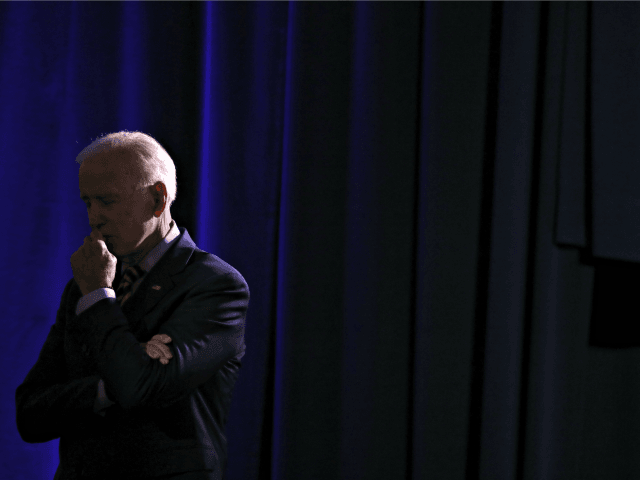Will Joe Biden receive the same kid gloves treatment on the second night of the 2020 Democratic candidate presidential debates hosted by NBC that Sen. Elizabeth Warren (D-MA) received on the first night of debates?
Warren was not challenged on her false claims of Native American ancestry, a key vulnerability for her in any potential general election matchup with President Trump, by the five NBC moderators or the nine also-ran candidates on the stage with her Wednesday when ten of the 25 announced Democratic candidates for president participated in the two-hour-long first installment of the two consecutive nights of debate.
The Massachusetts senator was the only one of the five top polling candidates to appear in the first debate. The other four top polling candidates–Biden, Sen. Bernie Sanders (I-VT), Sen. Kamala Harris (D-CA), and South Bend, Indiana Mayor Pete Buttigieg–will share the stage with six also-rans on Thursday evening at the second debate.
While Warren was given a pass by the moderators and her fellow candidates alike, one of many reasons to watch the second debate will be to see if that same generosity of spirit will be extended to Biden in Thursday’s second debate, who will have difficulty answering questions about his son’s business deals in China and Ukraine.
The business dealings of the former vice president’s son, Hunter Biden, were brought to national attention by Peter Schweizer’s recent book, Secret Empires: How the American Political Class Hides Corruption and Enriches Family and Friends.
In that book, Schweitzer described the dangers of what he called “corruption by proxy,” which is corruption by financial dealings of parties interested in the outcome of national policy with the relatives of influential elected political figures.
Hunter Biden’s financial dealings in China and the Ukraine were front and center in Schweizer’s book:
As an example of American princelings, Schweizer pointed to the Chinese government’s provision of $1.5 billion in funding for Bohai Harvest RST (BHR), a private equity firm upon whose board Joe Biden’s son, Hunter Biden, sits.
“In December of 2013, Vice President Joe Biden flies to Asia for a trip, and the centerpiece for that trip is a visit to Beijing, China,” said Schweizer. “To put this into context, in 2013, the Chinese have just exerted air rights over the South Pacific, the South China Sea. They basically have said, ‘If you want to fly in this area, you have to get Chinese approval. We are claiming sovereignty over this territory.’ Highly controversial in Japan, in the Philippines, and in other countries. Joe Biden is supposed to be going there to confront the Chinese. Well, he gets widely criticized on that trip for going soft on China. So basically, no challenging them, and Japan and other countries are quite upset about this.”
Elaborating, Schweizer said, “Well, I think the reason he goes soft on China is because with him on that trip, flying on Air Force Two, is his son Hunter Biden, and ten days after they return from China, Hunter Biden — who has this small firm, he has no background in private equity, he has no background in Chinese finance — gets a whopping $1.5 billion deal from the Chinese government. This is the Chinese government giving Joe Biden and a [John] Kerry confidante the management over this money, and they made huge fees off of this money, and it’s an example of this kind of corruption. That’s the first of three major deals that the Chinese government does with people who are either the children — that is the sons — or close aides to Vice President Biden or Secretary of State John Kerry.”
After the book’s publication, Joe Biden’s astonishing comments in Iowa on May 1 that China was not a threat raised the possibility that the Communist Chinese government’s $1.5 billion investment through the Bank of China in the hedge fund Hunter Biden co-managed had influenced his posture towards China. Such a possibility raises a significant general election vulnerability for Biden, should he become the Democrat nominee, since President Trump has made his challenge of China’s unfair trade practices and military aggressiveness a central theme of his administration.
For Bernie Sanders, the possibility of confronting Biden on his son’s business deals in China and the Ukraine represent a “do-over” of sorts for him. In an October 2105 debate, Sanders famously failed to confront Hillary Clinton, his 2016 rival for the 2016 Democrat nomination, over her use of a private server to send and receive over 30,000 emails while Secretary of State, an apparent violation of security protocols that loomed large in her 2016 general election battle with President Trump. Sanders chose not to engage at the time, saying he was “not interested” in those emails.
With his standing in the national polls slipping, Sanders may be looking for a way to reverse the trend, and attacking Biden on the China and Ukraine connection could well do that.
Buttigieg may also have a reason to go on the attack against Biden. His star is not shining quite as brightly since a recent police shooting in South Bend has called some to question whether he can be both a presidential candidate and the mayor of a troubled city at the same time.
Foreign policy, and in particular Biden’s potentially comprised position due to his son’s business dealings in China and Ukraine, would be a natural point of attack on Biden for Buttigieg, since he served a tour of duty in Afghanistan as an intelligence officer in the Navy.
NBC’s moderators, however, may be most in need of posing a direct question to Biden on his son’s dealings with China and Ukraine, since their collective performance as moderators of the first night of debates was widely panned.
